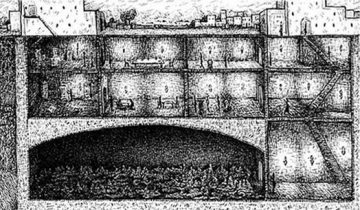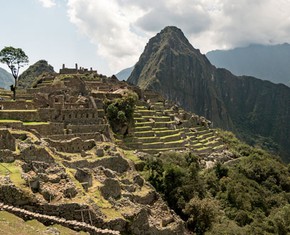The views expressed in our content reflect individual perspectives and do not represent the authoritative views of the Baha'i Faith.
Prophets always praise their predecessors, foretell the arrival of their future incarnations and promise to return to give humanity the guidance it needs.
That foretelling—the actual prophecies that make them prophets—relates directly to the Baha’i concept of progressive revelation, which links all of the prophets and founders of the world’s major Faiths in one great chain of being, as messengers of one God and as harbingers of one essential spiritual teaching. Throughout human history, all cultures have had their prophets and messengers. In every case, those prophets promised their followers that they would come again. Called “messianic” promises, they assure us that the prophets of old will return.
Every major Faith contains these promises. To the Hindus, Krishna promised to personally return, and said he would do so “from age to age.” In the Tanakh, Judaism prophesies the coming of another prophet like Moses or Elijah, calling that promised Messiah a future king or savior. Buddha promised all Buddhists that he was not the first Buddha—which means “Enlightened One”—and that he would not be the last. Zoroastrian prophecies predicted the advent of a “world-renovator” who would fulfill the teachings of Zoroaster. Every Christian in the world awaits the return of Christ, who said “I will come again and receive you to Myself; that where I am, there you may be also.” – John 14:3. Muslims eagerly await the appearance of the Twelfth Imam or the Mahdi, who Muhammad said would bring peace and justice to the world. Multiple indigenous traditions from all over the world have similar prophecies about the coming of a universal redeemer who will usher in an era of unity and harmony amongst all humanity.
This means—if you read the prophecies of every Faith carefully—that no religion is final.
Of course, lots of adherents of various religions somehow believe that their Faith is the last word in religious truth—but how can that be, if every one of the founders of those Faiths promised to return?
That’s why Baha’u’llah’s teachings recognize that religious truth is progressive, ever-advancing and relative:
Shoghi Effendi the great-grandson of Baha’u’llah.
The Faith standing identified with the name of Baha’u’llah disclaims any intention to belittle any of the Prophets gone before Him, to whittle down any of their teachings, to obscure, however slightly, the radiance of their Revelations, to oust them from the hearts of their followers, to abrogate the fundamentals of their doctrines, to discard any of their revealed Books, or to suppress the legitimate aspirations of their adherents. Repudiating the claim of any religion to be the final revelation of God to man, disclaiming finality for His own Revelation, Baha’u’llah inculcates the basic principle of the relativity of religious truth, the continuity of Divine Revelation, the progressiveness of religious experience. His aim is to widen the basis of all revealed religions and to unravel the mysteries of their scriptures. He insists on the unqualified recognition of the unity of their purpose, restates the eternal verities they enshrine, coordinates their functions, distinguishes the essential and the authentic from the nonessential and spurious in their teachings, separates the God-given truths from the priest-prompted superstitions, and on this as a basis proclaims the possibility, and even prophecies the inevitability, of their unification, and the consummation of their highest hopes. – Shoghi Effendi, The Promised Day is Come, p. 108.
The Bible says that Christ will return “like a thief in the night”—in other words, so quietly and unpredictably that most people will miss it. Baha’is believe that exact prophecy was fulfilled when Baha’u’llah’s revelation began—and that it has only gradually begun to dawn on the world.
In the midst of his imprisonment in Tehran’s Black Pit, and in the deepest part of his soul, Baha’u’llah learned that he would fulfill those previous prophecies:
Diagram of The Black Pit (Siyah Chal).
While breathing the foul air of the Siyah-Chal [the Black Pit], with his feet in stocks and His head weighed down by the mighty chain, Baha’u’llah received, as attested by Him in His Epistle to the Son of the Wolf, the first intimations of His station as the Supreme Manifestation of God—He whose appearance have been foretold by the Prophets of old in such terms as ‘the reincarnation of Krishna,’ the ‘fifth Buddha,’ the ‘Shah Bahram,’ the ‘Lord of Hosts,’ the Christ returned ‘in the glory of the Father,’ the ‘Spirit of God,’ and by the Bab as ‘Him Whom God shall make manifest.’ – Adib Taherzadeh, The Revelation of Baha’u’llah, Volume 1, p. 10.


















Comments
Sign in or create an account
Continue with Googleor